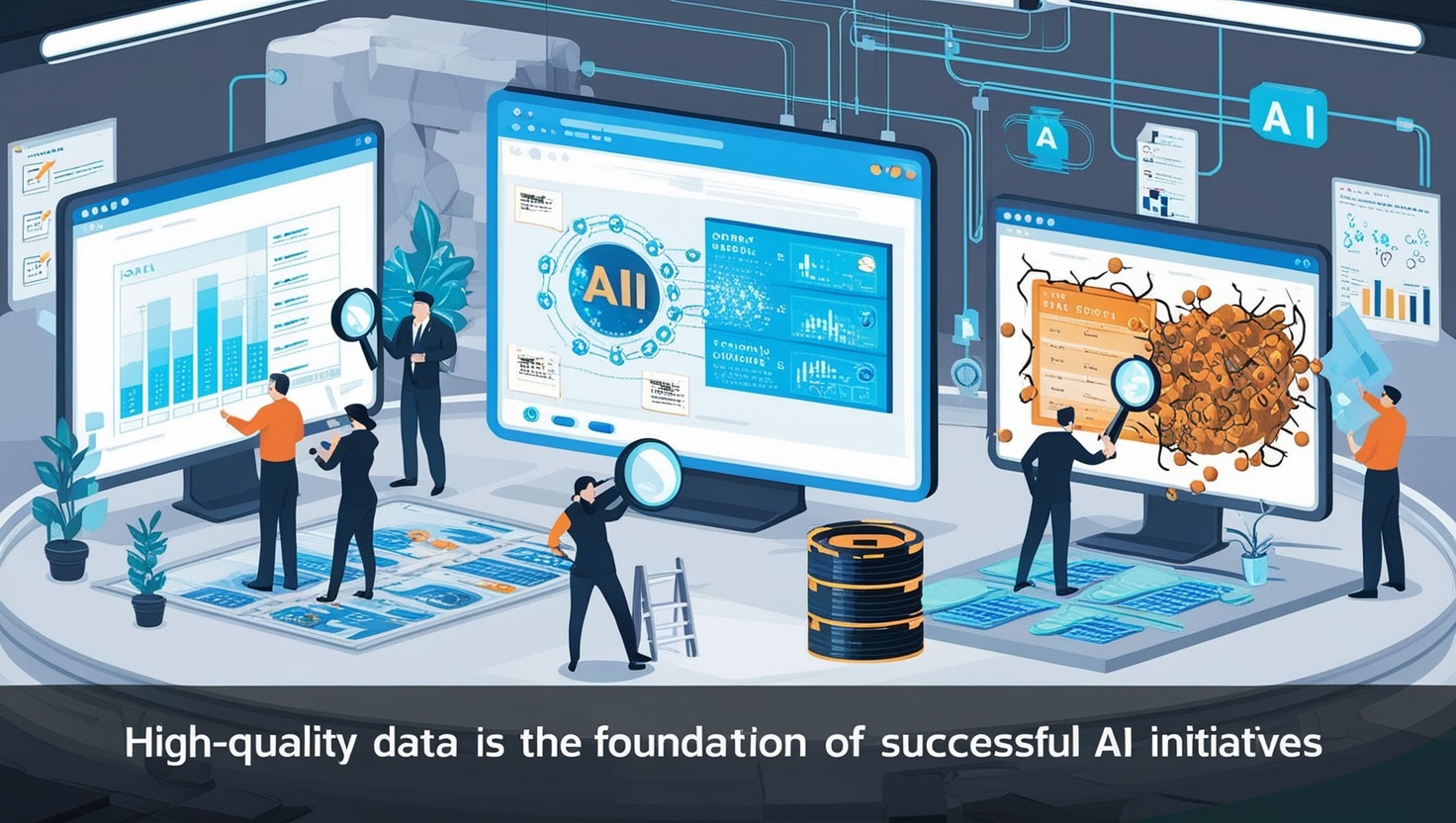
AI in Customer Experience: Trends, Benefits and Real-World Examples
Table of Contents
In today’s competitive landscape, customer experience is a key differentiator, with consumers expecting fast, personalised, and seamless interactions. Businesses that fail to meet these expectations risk losing customers to competitors who can. Artificial Intelligence (AI) is revolutionising the way companies engage with their audiences by automating responses, predicting needs, and delivering tailored experiences. Studies show that 80% of consumers expect real-time interactions, while over 70% prefer brands that personalise their services, making AI an essential tool for boosting satisfaction and loyalty.
This article explores how transformative AI in customer experience is through chatbots, predictive analytics, and automated support systems. From streamlining interactions to proactively addressing customer needs, AI is enhancing engagement while improving efficiency. Real-world applications highlight how businesses are leveraging AI to create more responsive and personalised experiences.
However, adopting AI comes with challenges, including data privacy concerns, maintaining a balance between automation and human touch, and the need for continuous updates. By addressing these factors strategically, businesses can maximise AI’s potential to deliver exceptional customer experiences and drive long-term success.
“Customers don’t just want good service; they want immediate, relevant interactions that solve their problems or enrich their journey. AI helps deliver that at scale, but it must be done thoughtfully,” says Ciaran Connolly, Director of ProfileTree.
AI in Customer Experience
Customer experience (CX) has become the defining factor for business success, often surpassing price and product in importance. A single negative interaction can lead to lost revenue and erode customer trust, especially in an era where social media and online reviews amplify consumer voices. Dissatisfied customers can quickly damage a brand’s reputation, making it harder to attract new business. Conversely, a seamless, positive experience fosters loyalty, generates word-of-mouth recommendations, and encourages repeat purchases. In this landscape, AI’s ability to deliver speed, personalisation, and consistency is invaluable.
AI-powered solutions enhance CX by operating 24/7, ensuring minimal wait times, and handling routine enquiries with accuracy. Virtual assistants and chatbots provide instant support, freeing human agents to focus on complex or emotionally sensitive issues. Additionally, AI-driven analytics allow businesses to anticipate customer needs, offering personalised product recommendations and tailored interactions. This level of automation not only streamlines operations but also creates a smoother, more engaging experience for customers.
Beyond automation, AI’s predictive capabilities help businesses proactively address concerns before they escalate. Sentiment analysis tools can gauge customer emotions in real time, prompting appropriate responses to improve satisfaction. AI also enables hyper-personalisation by learning from past interactions and adjusting services accordingly. As companies embrace these technologies, they can cultivate stronger relationships with their customers, turning exceptional service into a lasting competitive advantage.
AI-Powered Chatbots and Virtual Assistants
Gone are the days when chatbots were limited to answering just a handful of FAQs. Today’s AI chatbots leverage advanced natural language processing (NLP) to “understand” user queries, reference knowledge bases, and provide contextually relevant answers. These intelligent assistants significantly reduce wait times, handle multiple interactions simultaneously, and improve the overall customer experience.
- E-commerce: Chatbots guide shoppers through product selections, answer stock enquiries, provide personalised recommendations, and even complete checkout. Some retailers report increased conversions and higher customer satisfaction when AI chatbots assist in real time.
- Banking: Virtual assistants enable customers to check balances, transfer money, pay bills, and raise support tickets instantly. This speeds up routine banking processes while reducing the load on call centres.
- Travel and Hospitality: AI-driven assistants manage bookings, upsell ancillary services (such as extra baggage, seat upgrades, or spa sessions), and respond to itinerary changes 24/7, enhancing convenience for travellers.
- Healthcare: AI chatbots assist with appointment scheduling, symptom checking, and medication reminders. They can also provide preliminary health advice, reducing pressure on healthcare professionals.
- Telecommunications: AI-powered support bots help users troubleshoot issues, upgrade plans, and resolve billing queries without needing to wait for a human agent.
- Retail and Customer Support: AI chatbots handle returns, order tracking, warranty claims, and personalised follow-ups, ensuring a seamless post-purchase experience.
- Education and Training: AI chatbots act as virtual tutors, answering student questions, providing explanations, and guiding learners through educational modules.
Research indicates that 95% of consumers believe customer service chatbots will become even more common in the coming years, and about 60% have used a chatbot at least once for simple enquiries. Many AI-driven chatbots can resolve up to 70% of queries without human escalation, leading to substantial cost savings, improved efficiency, and higher customer satisfaction.
Personalisation and Predictive Insights
Modern consumers expect brands to understand their preferences and deliver relevant, tailored experiences. Irrelevant product recommendations, generic mass emails, and one-size-fits-all marketing no longer resonate. AI enhances personalisation by analysing vast amounts of data—past purchases, browsing history, demographics, and contextual factors like time of day or location.
This allows businesses to create hyper-personalised interactions that improve customer engagement and satisfaction. For example, e-commerce platforms use machine learning to present dynamic product recommendations, increasing average order values and enhancing the shopping experience. Similarly, websites can adjust layouts, offers, and messaging in real time to cater to returning visitors differently from first-time users.
AI also enables predictive customer support by anticipating potential issues and offering proactive solutions. If a user repeatedly encounters an error in a software application, AI can trigger a tutorial or troubleshooting guide before frustration sets in. This proactive approach extends to customer service chatbots, which remember past interactions and provide more relevant responses, making support more efficient and personalised. AI-powered chat assistants can also recommend related products or services based on previous purchases, mimicking the attentiveness of in-store sales associates.
Additionally, intelligent pricing strategies allow businesses to dynamically adjust prices based on demand, competitor pricing, and individual customer behaviour, ensuring competitive yet appealing offers.
Beyond support and sales, AI-driven personalisation enhances marketing effectiveness. Rather than sending the same email to all subscribers, AI segments audiences into precise groups based on behaviour and interests. Each group receives personalised content, resulting in higher open rates, click-through rates, and conversions. AI can also deliver context-aware promotions by analysing real-time factors like weather or local events—pushing iced coffee deals on hot days while showcasing warm beverages in colder weather.
This level of personalisation fosters trust, making customers feel valued and understood. However, businesses must handle data responsibly, ensuring transparency and compliance with privacy regulations to maintain consumer confidence and long-term loyalty.
Voice Assistants and Speech Recognition
Voice technology has become a mainstream tool, integrated into smart speakers, smartphones, TVs, and even cars. Consumers increasingly rely on voice assistants like Alexa, Google Assistant, and Siri to complete tasks hands-free, making interactions more convenient and efficient. For businesses, integrating voice AI offers another channel to engage customers naturally, providing a seamless and frictionless experience. From customer service to shopping and accessibility, voice technology is reshaping how businesses interact with their audiences.
- Voice-Enabled Customer Service: Instead of navigating complex IVR (Interactive Voice Response) menus, customers can simply say, “Cancel my subscription” or “Track my order,” and AI-powered voice assistants can process the request or route it to a specialist if needed.
- Enhanced Accessibility: Voice AI is invaluable for users with visual or physical impairments, enabling hands-free interactions and ensuring inclusivity. Businesses that adopt voice technology demonstrate a commitment to accessibility and expand their potential customer base.
- Voice Commerce: Consumers are increasingly using voice commands to reorder frequently purchased items, search for products, and even complete transactions. Retailers and e-commerce businesses that integrate voice purchasing options create a frictionless shopping experience.
- Smart Home Integrations: Businesses can develop voice-enabled applications that integrate with smart home devices. For example, a utility company might allow customers to check energy usage through a simple voice command, while a security company could enable users to control alarms and locks via voice assistants.
- Multilingual Support: AI-powered voice assistants can recognise and respond in multiple languages, allowing businesses to provide global customer support effortlessly. This reduces language barriers and enhances the user experience for non-native speakers.
- Voice Search Optimisation: As more consumers use voice search, businesses must ensure their content is optimised for conversational queries. Unlike traditional search, voice queries tend to be longer and more natural, requiring businesses to adjust their SEO strategies accordingly.
Voice commerce and voice interactions are projected to grow significantly, with an estimated 30% of UK households already owning at least one smart speaker. Businesses that fAIl to adopt voice AI risk missing out on this rapidly expanding market segment. As voice technology continues to evolve, companies that embrace it early can gain a competitive edge in customer experience, accessibility, and engagement.
Real-World Success Stories
AI is already transforming customer experience across industries, helping businesses streamline operations, improve engagement, and drive loyalty. From chatbots reducing response times to predictive analytics enhancing personalisation, companies are leveraging AI to deliver seamless, data-driven interactions. The following success stories highlight how leading brands are using AI to redefine customer experience and achieve measurable results.
Online Fashion Retailer
A fashion site launched an AI chatbot to act as a “virtual stylist.” It asked users about their style preferences or the occasion they were dressing for, then suggested outfits. Customers loved the real-time feedback, and average basket sizes increased by 25%. The brand also reported a 15% drop in returns because the suggested outfits were more aligned with customer taste.
Bank with AI-driven Personal Banker
A major bank introduced an AI personal banker within its mobile app. Users could check balances, transfer funds, or enquire about loan eligibility by simply chatting. The feature included predictive finance tips (“You have a recurring subscription due soon—would you like to set aside funds?”). Customer satisfaction scores rose notably, and call centre volume decreased by 40%.
Hotel Chain’s Virtual Concierge
A luxury hotel group used an AI-powered virtual concierge on their website and app. Guests could request room service, explore local attractions, or ask for extra towels all through the AI. By learning from guest patterns, it made relevant suggestions (like recommending the spa to someone who previously booked spa treatments). This personal touch significantly increased upselling of hotel services, contributing to higher revenue per guest.
Implementation Considerations
While AI has the potential to revolutionise customer experience, it is not a simple plug-and-play solution. Thoughtful implementation is essential to ensure AI-driven tools enhance interactions rather than create frustration. Several key factors must be considered to maximise AI’s effectiveness and maintain customer trust.
One of the most critical elements is data quality. AI relies on vast amounts of data to deliver personalised recommendations, predict customer needs, and automate responses. However, if the data is incomplete, outdated, or biased, the AI’s outputs can be flawed, leading to inaccurate suggestions and poor customer experiences. Businesses must invest in data hygiene practices, regularly auditing and refining their datasets to ensure accuracy and relevance. Additionally, AI should be trained on diverse data to prevent biases that could alienate certain customer segments.
Privacy and security are also paramount. AI-driven customer interactions often involve collecting and analysing personal data, making compliance with regulations such as GDPR and CCPA crucial. Customers are becoming increasingly aware of how their data is used, and any hint of misuse or security vulnerability can erode trust. Businesses should implement transparent data policies, encrypt sensitive information, and allow users control over their data to maintain credibility and legal compliance.
Despite AI’s advancements, human oversight remains essential. Even the most sophisticated AI can make errors, misinterpret user intent, or struggle with highly nuanced situations. A well-designed system should include clear escalation paths that allow human agents to take over when needed, ensuring that customers don’t get stuck in an endless AI loop. This hybrid approach balances efficiency with empathy, offering the best of both automation and human interaction.
Equally important is staff training. Employees should understand how AI systems work, how to interpret AI-driven insights, and when to intervene. If customer service representatives, sales teams, or marketers do not trust AI-generated recommendations, they may ignore them altogether, diminishing the system’s value. Proper trAIning ensures employees can confidently use AI to enhance their roles rather than seeing it as a competitor.
Finally, consistency with brand tone is crucial for maintaining a cohesive customer experience. AI-driven communications, whether through chatbots, email automation, or voice assistants, should reflect the brand’s personality. Generic or robotic-sounding interactions can feel impersonal and off-brand, reducing engagement. Customising AI responses or at least ensuring alignment with brand guidelines helps maintain a natural, engaging, and on-brand customer experience.
By addressing these implementation considerations, businesses can harness AI’s full potential while avoiding pitfalls that could undermine its effectiveness. A strategic, well-executed AI approach leads to seamless customer interactions, increased efficiency, and stronger brand loyalty.
“When adopting AI for customer experience, remember it’s still your brand on the line. The best AI solutions feel personal and consistent, just scaled up by technology. The human element remains crucial,” says Ciaran Connolly.
The Future of AI-powered Customer Experience
As AI continues to evolve, its role in customer experience (CX) will become even more sophisticated, offering deeper personalisation, proactive engagement, and seamless interactions across multiple touchpoints. The next wave of AI-driven CX innovations will focus on understanding customers on a more human level and anticipating their needs before they even arise.
Key advancements in AI-driven customer experience include:
- Emotional AI: Detects customer emotions through voice tone, facial expressions, or text sentiment, adjusts responses accordingly (e.g., offering a calmer tone if frustration is detected), and escalates issues to human agents when needed for a more personalised resolution.
- Multi-modal Interactions: Integrates voice, text, and visuals for a richer communication experience, allows users to ask questions via voice while receiving real-time images or analytics on-screen, and enhances engagement in sectors like retail, education, and technical support.
- Predictive CX: AI proactively anticipates customer needs and takes action automatically. Examples include: Auto-reordering frequently purchased items, scheduling appointments before an issue arises, and dynamically adjusting website layouts based on user behaviour.
- AI-led Loyalty Programmes: Moves beyond generic rewards to personalised incentives based on customer preferences. For examples, early access to new products for frequent buyers and early access to new products for frequent buyers. It also strengthens brand loyalty and encourages repeat purchases.
- Augmented Reality (AR) Shopping Assistants: Allows customers to try on products virtually before purchasing and enhances online shopping experiences by reducing uncertainty.
- Hyper-Personalised AI Assistants: Remembers past interactions across different platforms, provides contextually relevant suggestions in real-time, and creates a seamless, omnichannel customer experience.
With these advancements, AI’s role in CX will shift from simple automation to intelligent, proactive, and deeply personalised engagement. Businesses that embrace these innovations will gain a competitive edge by delivering frictionless, highly tailored experiences that drive customer satisfaction and loyalty.
A Human Touch at Scale
AI has emerged as the linchpin for delivering the fast, personalised, convenient experiences modern customers desire. It can handle repetitive tasks, connect the dots between disparate data points, and respond in real time—capabilities humans alone cannot consistently match at scale. But that doesn’t mean the human touch disappears. The most successful uses of AI in customer experience strike a balance between automation and empathy. Humans are still needed for complex queries, emotional issues, or high-stakes relationships.
For organisations striving to keep pace, embedding AI in CX processes is no longer a ‘maybe’—it’s vital for staying competitive. Yet success requires the right implementation strategy, data integrity, staff training, and ongoing oversight.
If you’re looking to bring AI into your customer experience strategies, ProfileTree offers end-to-end guidance. From identifying AI use cases to integrating chatbot platforms or training staff on usage, we can help you create experiences that delight and differentiate.
Ready to exceed customer expectations with AI? Book a call with ProfileTree now to explore AI-driven solutions tailored to your industry’s unique customer journey.




